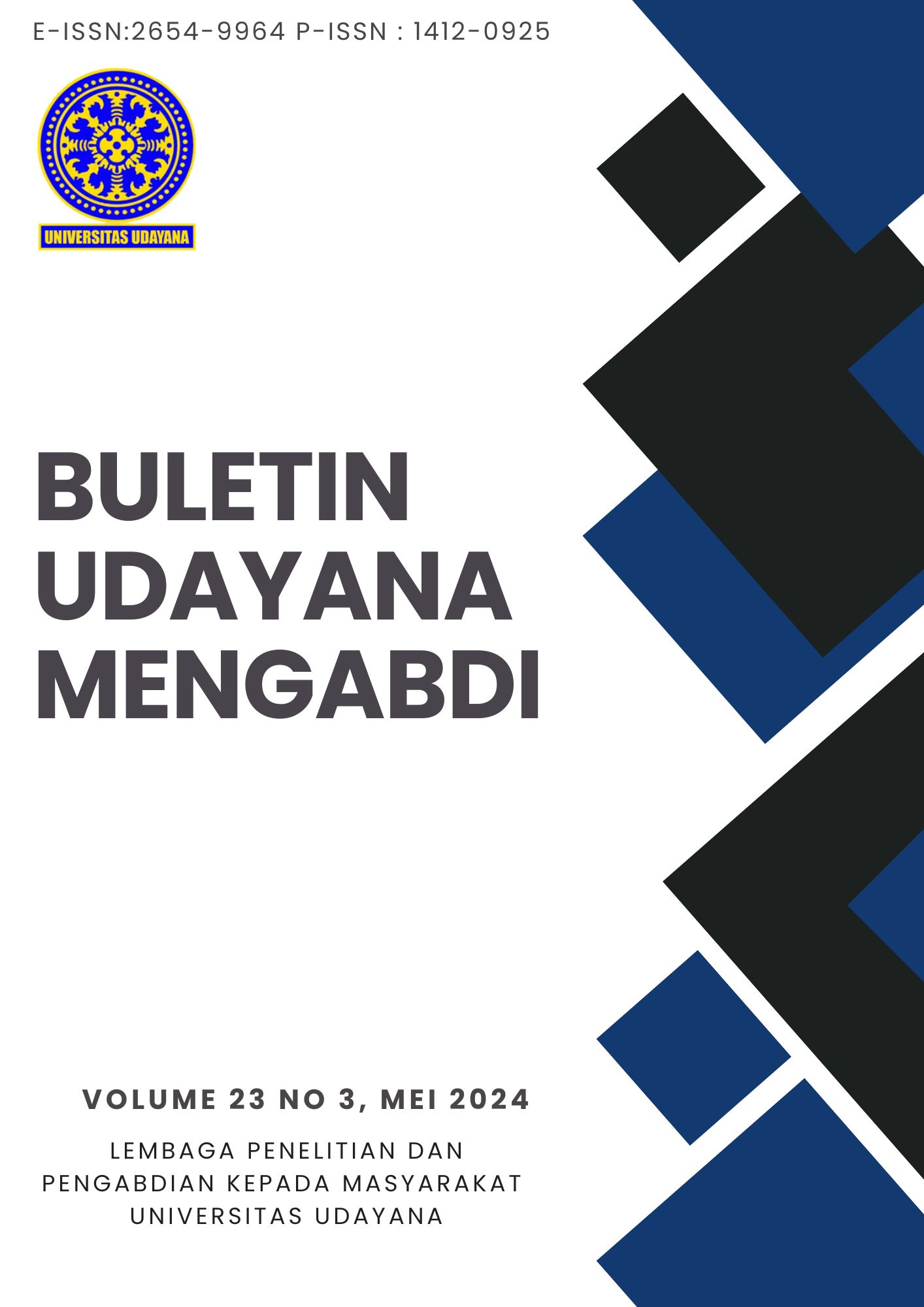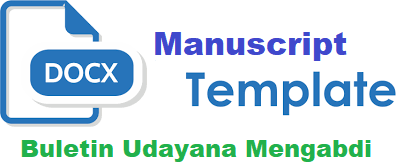GERAKAN MENCEGAH RESISTANSI ANTIBIOTIK DENGAN PEMBENTUKAN DESA BIJAK ANTIBIOTIK
Abstract
Background. Antibiotic or antimicrobe resistance is one of the health issues that threaten society. Inappropriate indications for use, untimely withdrawal, and overuse of large amounts of antimicrobials lead to this resistance. Overuse of antimicrobials also occurs in livestock, resulting in residues in products that are later consumed by humans and in waste in the environment. Prevention of antimicrobial resistance needs to be pursued in both households and the livestock sector. Objective. The establishment of the Antibiotic Wise Village (SAJAKA) aims to educate as well as increase awareness and concern of the community and farmers in using antimicrobials wisely and rationally. Methods. Guidance activities are carried out to the community and farmer groups using the discussion method. In order to celebrate the World Antimicrobial Awareness Week 2022, there was also a SAJAKA gathering night activity filled with education to the community through the media of bondres role-playing art. Results. The coaching activity was attended by 5 groups of breeders and the gathering night event was attended by 200 local villagers from various ages and backgrounds. In this activity, the coverage of the community who received information was comprehensive and a 28% increase in knowledge was obtained from the posttest. Conclusion. Sharing knowledge with ordinary people about the wise use of antimicrobials is the key to preventing antimicrobial resistance.
Keywords: antibiotic, resistance, wise
Downloads
References
1. Siahaan S, Herman MJ, Fitri N. 2022. Antimicrobial Resistance Situation in Indonesia: A Challenge of Multisector and Global Coordination. J Trop Med. Ed 7;2022:2783300. doi: 10.1155/2022/2783300. PMID: 35145554; PMCID: PMC8822317.
2. Parathon, H., Kuntaman, K., Widiastoety, T. H., Muliawan, B. T., Karuniawati, A., Qibtiyah, M., Djanun, S., Tawilah, J.F., Aditama, T., Thamlikitkul, V., Vong, S. 2017. Progress towards antimicrobial resistance containment and control in Indonesia. BMJ, j3808. doi:10.1136/bmj.j3808
3. Safari D, Kurniati N, Waslia L, et al. 2019. Serotype distribution and antimikroba susceptibility of Streptococcus pneumoniae strains carried by children infected with human immunodeficiency virus. PLoS One 2014;9:e110526 10.1371/journal.pone. 0110526 pmid:25343448.
4. Soewignjo S, Gessner BD, Sutanto A, et al. 2001. Streptococcus pneumoniae nasopharyngeal carriage prevalence, serotype distribution, and resistance patterns among children on Lombok Island, Indonesia. Clin Infect Dis 2001;32:1039-43. 10.1086/319605
5. Farida H, Severin JA, Gasem MH, et al. 2014. Nasopharyngeal carriage of Streptococcus pneumonia in pneumonia-prone age groups in Semarang, Java Island, Indonesia. PLoS One 2014;9:e87431.
6. Severin JA, Mertaniasih NM, Kuntaman K, et al. 2010. Study Group ‘Antimicrobial Resistance in Indonesia: Prevalence and Prevention’ (AMRIN). Molecular characterization of extended-spectrum beta-lactamases in clinical Escherichia coli and Klebsiella pneumoniae isolates from Surabaya, Indonesia. J Antimicrob Chemother 2010;65:465-9. 10.1093/jac/dkp471
7. World Health Organization. 2014. Antimicrobial Resistance Global Report on Surveillance. Salma. 2021 Research Reveals 70% of Pharmacies in Indonesia Dispense Antimikrobas Without Prescriptions. Media Elektronik Universitas Gajah Mada.
8. Yusuf, Havan & Idris, Syafrison & Paul, Mathilde. 2018. Antimicrobial Usage Surveillance of Cattle in Indonesia to Address Antimicrobial Resistance. 10.2991/icpsuas-17.2018.77.
9. Haryono, Pujo. 2019. TeknologDAFTAR PUSTAKA
1. Siahaan S, Herman MJ, Fitri N. 2022. Antimicrobial Resistance Situation in Indonesia: A Challenge of Multisector and Global Coordination. J Trop Med. Ed 7;2022:2783300. doi: 10.1155/2022/2783300. PMID: 35145554; PMCID: PMC8822317.
2. Parathon, H., Kuntaman, K., Widiastoety, T. H., Muliawan, B. T., Karuniawati, A., Qibtiyah, M., Djanun, S., Tawilah, J.F., Aditama, T., Thamlikitkul, V., Vong, S. 2017. Progress towards antimicrobial resistance containment and control in Indonesia. BMJ, j3808. doi:10.1136/bmj.j3808
3. Safari D, Kurniati N, Waslia L, et al. 2019. Serotype distribution and antimikroba susceptibility of Streptococcus pneumoniae strains carried by children infected with human immunodeficiency virus. PLoS One 2014;9:e110526 10.1371/journal.pone. 0110526 pmid:25343448.
4. Soewignjo S, Gessner BD, Sutanto A, et al. 2001. Streptococcus pneumoniae nasopharyngeal carriage prevalence, serotype distribution, and resistance patterns among children on Lombok Island, Indonesia. Clin Infect Dis 2001;32:1039-43. 10.1086/319605
5. Farida H, Severin JA, Gasem MH, et al. 2014. Nasopharyngeal carriage of Streptococcus pneumonia in pneumonia-prone age groups in Semarang, Java Island, Indonesia. PLoS One 2014;9:e87431.
6. Severin JA, Mertaniasih NM, Kuntaman K, et al. 2010. Study Group ‘Antimicrobial Resistance in Indonesia: Prevalence and Prevention’ (AMRIN). Molecular characterization of extended-spectrum beta-lactamases in clinical Escherichia coli and Klebsiella pneumoniae isolates from Surabaya, Indonesia. J Antimicrob Chemother 2010;65:465-9. 10.1093/jac/dkp471
7. World Health Organization. 2014. Antimicrobial Resistance Global Report on Surveillance. Salma. 2021 Research Reveals 70% of Pharmacies in Indonesia Dispense Antimikrobas Without Prescriptions. Media Elektronik Universitas Gajah Mada.
8. Yusuf, Havan & Idris, Syafrison & Paul, Mathilde. 2018. Antimicrobial Usage Surveillance of Cattle in Indonesia to Address Antimicrobial Resistance. 10.2991/icpsuas-17.2018.77.
9. Haryono, Pujo. 2019. Teknologi Pembuatan Pupuk Organik Dari Limbah Kotoran Ternak Sapi dengan Metode Fermentasi. Diunduh tanggal 15 Juni 2022. Available at: https://sulteng.litbang.pertanian.go.id/ind/index.php/info-teknologi/828-teknologi-pembuatan-pupuk-organik-dari-limbah-kotoran-ternak-sapi-dengan-metode-fermentasi.
i Pembuatan Pupuk Organik Dari Limbah Kotoran Ternak Sapi dengan Metode Fermentasi. Diunduh tanggal 15 Juni 2022. Available at: https://sulteng.litbang.pertanian.go.id/ind/index.php/info-teknologi/828-teknologi-pembuatan-pupuk-organik-dari-limbah-kotoran-ternak-sapi-dengan-metode-fermentasi.

This work is licensed under a Creative Commons Attribution-ShareAlike 4.0 International License.

This work is licensed under a Creative Commons Attribution-ShareAlike 4.0 International License.




.png)


1.png) GARUDA - GARBA RUJUKAN DIGITAL
GARUDA - GARBA RUJUKAN DIGITAL



